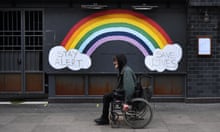A former employee of Britain’s equality watchdog has accused it of failing to support the human rights of ethnic minorities and colluding in the denial of structural and institutional racism.
In an email sent to colleagues just before she left the Equality and Human Rights Commission (EHRC), the member of staff also accused the watchdog of “racial gaslighting”.
The email, seen by the Guardian, mirrors concerns about the EHRC held outside the organisation, which has been at the centre of a number of controversies, calling into question its commitment to people of colour and other minorities.
The former mid-ranking employee, whom the Guardian is not naming, wrote that it had become increasingly difficult to talk about race at the EHRC.
She claimed: “I’m tired of constantly having to be the person who has to both explain racism and defend that it exists (also known as racial gaslighting); and by racism I mean structural and institutional racism.
“I’m tired of being part of an institution that is meant to support the equality and human rights of ethnic minority people, that is meant to acknowledge and accept structural and institutional racism, yet find myself in an institution that is colluding in its denial.”
As an example, she said structural racism terminology had been removed from the EHRC’s inquiry into racial inequality in health and social care workplaces – despite the fact that NHS Providers has acknowledged its existence – and that minority ethnic colleagues subsequently felt compelled to leave the inquiry.
She also cited the EHRC’s positive response to the government-commissioned Sewell report on race and ethnic disparities, which was widely criticised, including by UN human rights experts who said it tried to “normalise white supremacy”. Kishwer Falkner, the chair of the EHRC, welcomed the report when it was published, saying it “identifies the varied causes of disparities”.
In a speech last year the then minister for women and equalities, Liz Truss, announced a shift in the government’s equality priorities away from gender and race, saying the watchdog commissioners would “drive this agenda forward”.
The email sent by the former EHRC employee reads: “Some of our senior leadership in England has helped dismantle the backbone of the commission – its integrity and authenticity – when it comes to race. This is incredibly difficult. Not only am I experiencing structural and institutional racism, I also have to try to fight it, all while the government and now the EHRC tell me that it doesn’t exist.”
Parliament’s joint committee on human rights has accused the EHRC of failing “to provide leadership and gain trust in tackling racial equality” and called for the recreation of a body similar to the Commission for Racial Equality, which was disbanded and folded into the EHRC in 2007.
An EHRC spokesperson said: “The general allegation that the EHRC is not prioritising the protected characteristic of race is wrong; work to combat race discrimination continues to be a priority under our strategic plan. However, it is not the role of the EHRC to develop or promote particular political theories on racism; rather, we are a regulator tasked by statute with enforcing and upholding the law of the land.
“In order to do that, we necessarily work through concepts that have legal meaning, rather than concepts which are not defined in law. Our mandate is to concentrate on eliminating race discrimination through using our powers of compliance, enforcement and litigation, which is where our current work is focused, rather than entering into debate on political ideas.”








